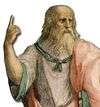Metaxy
| Part of a series on |
| Plato |
|---|
 Plato from Raphael's The School of Athens (1509–1511) |
| Allegories and metaphors |
| Related articles |
|
Metaxy (Greek: μεταξύ) or metaxu is defined in Plato's Symposium via the character of the priestess Diotima as the "in-between" or "middle ground". Diotima, tutoring Socrates, uses the term to show how oral tradition can be perceived by different people in different ways. In the poem by Socrates she depicts Eros as not an extreme or purity; rather, as a daimon Eros is in-between the divine Gods and mankind. Diotima thus exposes the flaws of oral tradition; it uses strong contrasts to express truth, thus revealing vulnerability to sophistry. This portion of the dialogue points to the idea that reality is perceptible only through one's character (which includes one's desires and prejudices and one's limited understanding of logic). Man moves through the world of Becoming, the ever changing world of sensory perception, into the world of Being—the world of forms, absolutes and transcendence. Man transcends his place in Becoming by eros, where man reaches the Highest Good, an intuitive and mystical state of consciousness. Neoplatonists like Plotinus later used the concept to express an ontological placement of Man between the Gods and animals.[1] Much like Diotima did in expressing that Eros as daemon was in-between the Gods and mankind. Love (Ἔρως Eros) as the thing in between or child of Poverty (Πενία Penia) and Possession (Πόρος Poros).[2]
Modern use
Other philosophers like political philosopher Eric Voegelin used the term to mean the permanent place where man is in-between two poles of existence. Such as the infinite (Apeiron) and the finite (the divine mind or Nous) reality of existence or between the beginning of existence (Apeiron) and the Beyond existence (ἐπέκεινα epekeina). As a technical usage Voegelin defined Metaxy as the connection of the mind or nous to the material world and the reverse of the material world's connection to the mind as "consciousness of being". Under Voegelin it can also be interpreted to mean a form of perception in contrast to consciousness a template of the mind (or nous) in contrast to the dynamic and unordered flow of experiential consciousness. As a form of reflectiveness in-between two poles of experience (finite and the infinite or immanent and transcendent). The whole of existence being expressed as the cosmos. The Metaxy being man's connection to the material world this as the ground of being.[3] Voegelin taught that those who sought political power for its own end were sophists and those who were seeking meaning and truth in life or union with the knowable and true, were philosophers. Each of these positions manifests a different view regarding Plato's becoming and being; again the in-between each of these poles of experience is metaxy.
The concept is also used by Simone Weil. Recently, it has been incorporated into conceptions of education in a book by Sean Steel entitled, The Pursuit of Wisdom and Happiness in Education (New York: SUNY Press, 2014).
See also
References
- ↑ Rise and Decline of the Roman World By Hildegard Temporini, Wolfgang Haase pg 706 Text Enneads 3, Verse 8 line 4 "But humanity, in reality, is poised midway between gods and beasts, and inclines now to the one order, now to the other; some men grow like to the divine, others to the brute, the greater number stand neutral."
- ↑ Plato, Symposium 203b-c
- ↑ Eric Voegelin, “Reason: The Classic Experience,” in Voegelin, Published Essays, 1966-1985, vol. 12 of The Collected Works of Eric Voegelin, ed. Ellis Sandoz (Baton Rouge: Louisiana State University Press, 1990), 289-90; Order and History, Volume IV: The Ecumenic Age, vol. 17 of The Collected Works of Eric Voegelin, ed. Michael Franz (Columbia, MO: University of Missouri Press, 2000), 408.
Bibliography
- Navia, Luis E., Socrates, the man and his philosophy, pp. 30, 171. University Press of America ISBN 0-8191-4854-7.
- Cooper, John M. & Hutchinson, D. S. (Eds.) (1997). Plato: Complete Works, Hackett Publishing Co., Inc. ISBN 0-87220-349-2.
- Micael P. Federici, Eric Voegelin The Restoration of Order (2002) ISI Books ISBN 1-882926-74-9
- Steel, Sean. (2014). The Pursuit of Wisdom and Happiness in Education: Historical Sources and Contemplative Practices. New York: SUNY Press. ISBN 978-1-4384-5213-5